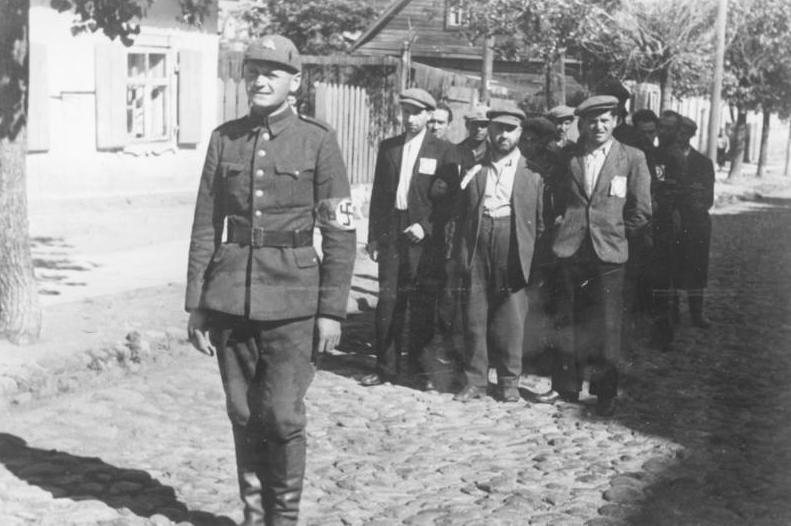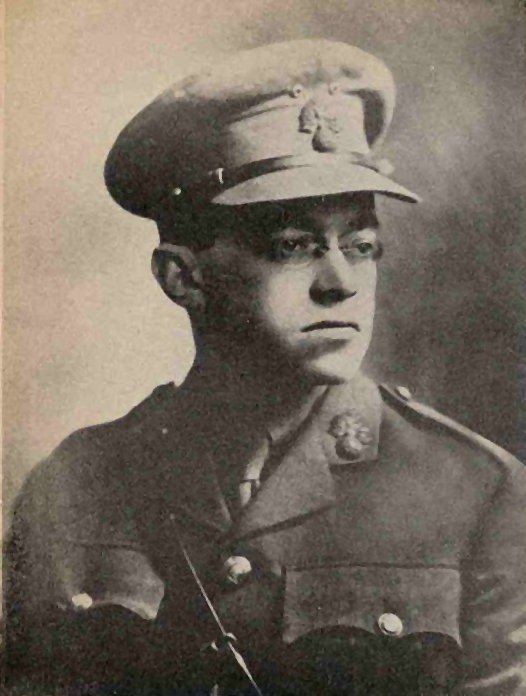|
Josef Glazman
Josef Glazman (1913 – 7 October 1943Yad Vashem staff "Josef Glazman") was a Lithuanian-Jewish resistance leader in the Vilna Ghetto. A member of the Revisionist Zionism movement prior to the German invasion of the Baltic states in 1941, afterwards he took part in resistance and youth movements in the ghetto. He also worked in the Jewish-run ghetto administration – first in the police, then later in the housing department. Glazman's relationship with the head of the ghetto, Jacob Gens, was difficult and led to Glazman's arrest several times. Eventually Glazman left the ghetto with a group of followers and formed a partisan unit in the Lithuanian forests. His partisan band was surrounded in October 1943 and Glazman and all but one of the members were killed by the Germans. Early life Josef Glazman was born in 1913 in the town of Alytus in southern Lithuania, then part of Russia.Shneidman ''Three Tragic Heroes'' pp. 125–126 He became head of the Betar youth movem ... [...More Info...] [...Related Items...] OR: [Wikipedia] [Google] [Baidu] |
Vilna Ghetto
The Vilna Ghetto was a World War II Jewish ghetto established and operated by Nazi Germany in the city of Vilnius in the modern country of Lithuania, at the time part of the Nazi-administered Reichskommissariat Ostland. During the approximately two years of its existence starvation, disease, street executions, maltreatment, and deportations to concentration and extermination camps reduced the ghetto's population from an estimated 40,000 to zero. Only several hundred people managed to survive, mostly by hiding in the forests surrounding the city, joining Soviet partisans,Piotr Zychowicz "Wybory Icchaka Arada"(the Yitzhak Arad choices), Rzeczpospolita, 12-07-2008. ''More external sources at Yitzhak Arad article.''Piotr Zychowicz "Icchak Arad: od NKVD do Yad Vashem" (From NKVD to Yad Vashem)Rzeczpospolita, July 12, 2008 or sheltering with sympathetic locals. Background Before the German-Soviet invasion of Poland in September 1939, Wilno (Vilna in Yiddish) was the capital of t ... [...More Info...] [...Related Items...] OR: [Wikipedia] [Google] [Baidu] |
Fareynikte Partizaner Organizatsye
The Fareynikte Partizaner Organizatsye ( yi, ; "United Partisan Organization"; referred to as FPO by its Yiddish initials) was a Jewish resistance organization based in the Vilna Ghetto that organized armed resistance against the Nazis during World War II.Yad Vashem Shoah Resource Center, The International School for Holocaust StudiesUnited Partisan Organization, Vilna./ref> The clandestine organisation was established by Communist and Zionist partisans. Their leaders were writer Abba Kovner, Josef Glazman and Yitzhak Wittenberg. Establishment of the FPO The FPO was formed on January 21, 1942, in the Vilna Ghetto. It took on the motto: ''"We will not allow them to take us like sheep to the slaughter."'' This was the first Jewish resistance organization that was established in the ghettos of Nazi-occupied Europe during World War II, followed by Łachwa underground formed in August 1942. Unlike in other ghettos – where the underground resistance was coordinated to some exten ... [...More Info...] [...Related Items...] OR: [Wikipedia] [Google] [Baidu] |
Lithuanian Jews
Lithuanian Jews or Litvaks () are Jews with roots in the territory of the former Grand Duchy of Lithuania (covering present-day Lithuania, Belarus, Latvia, the northeastern Suwałki and Białystok regions of Poland, as well as adjacent areas of modern-day Russia and Ukraine). The term is sometimes used to cover all Haredi Jews who follow a " Lithuanian" ( Ashkenazi, non- Hasidic) style of life and learning, whatever their ethnic background. The area where Lithuanian Jews lived is referred to in Yiddish as , hence the Hebrew term (). No other famous Jew is more closely linked to a specifically Lithuanian city than Vilna Gaon (in Yiddish, "the genius of Vilna"). Rabbi Elijah ben Solomon Zalman (1720–1797) to give his rarely used full name, helped make Vilna (modern-day Vilnius) a world center for Talmudic learning. Chaim Grade (1910–1982) was born in Vilna, the city about which he would write. The inter-war Republic of Lithuania was home to a large and influential Jewish ... [...More Info...] [...Related Items...] OR: [Wikipedia] [Google] [Baidu] |
Vilna Ghetto Inmates
Vilnius ( , ; see also #Etymology and other names, other names) is the capital and List of cities in Lithuania#Cities, largest city of Lithuania, with a population of 592,389 (according to the state register) or 625,107 (according to the municipality of Vilnius). The population of Vilnius's functional urban area, which stretches beyond the city limits, is estimated at 718,507 (as of 2020), while according to the Vilnius territorial health insurance fund, there were 753,875 permanent inhabitants as of November 2022 in Vilnius city and Vilnius district municipalities combined. Vilnius is situated in southeastern Lithuania and is the second-largest city in the Baltic states, but according to the Bank of Latvia is expected to become the largest before 2025. It is the seat of Lithuania's national government and the Vilnius District Municipality. Vilnius is known for the architecture in its Old Town of Vilnius, Old Town, declared a UNESCO World Heritage Site in 1994. The city was #Po ... [...More Info...] [...Related Items...] OR: [Wikipedia] [Google] [Baidu] |
Betar Members
The Betar Movement ( he, תנועת בית"ר), also spelled Beitar (), is a Revisionist Zionist youth movement founded in 1923 in Riga, Latvia, by Vladimir (Ze'ev) Jabotinsky. Chapters sprang up across Europe, even during World War II. After the war and during the settlement of what became Israel, Betar was traditionally linked to the original Herut and then Likud political parties of Jewish pioneers. It was closely affiliated with the pre-Israel Revisionist Zionist paramilitary group Irgun Zevai Leumi. It was one of many right-wing movements and youth groups arising at that time that adopted special salutes and uniforms. Some of the most prominent politicians of Israel were Betarim in their youth, most notably prime ministers Yitzhak Shamir and Menachem Begin, an admirer of Jabotinsky. Today, Betar promotes Jewish leadership on university campuses as well as in local communities. Its history of empowering Jewish youth dates back to before the establishment of the State of I ... [...More Info...] [...Related Items...] OR: [Wikipedia] [Google] [Baidu] |
1943 Deaths
Events Below, the events of World War II have the "WWII" prefix. January * January 1 – WWII: The Soviet Union announces that 22 German divisions have been encircled at Stalingrad, with 175,000 killed and 137,650 captured. * January 4 – WWII: Greek-Polish athlete and saboteur Jerzy Iwanow-Szajnowicz is executed by the Germans at Kaisariani. * January 11 ** The United States and United Kingdom revise previously unequal treaty relationships with the Republic of China (1912–1949), Republic of China. ** Italian-American anarchist Carlo Tresca is assassinated in New York City. * January 13 – Anti-Nazi protests in Sofia result in 200 arrests and 36 executions. * January 14 – January 24, 24 – WWII: Casablanca Conference: Franklin D. Roosevelt, President of the United States; Winston Churchill, Prime Minister of the United Kingdom; and Generals Charles de Gaulle and Henri Giraud of the Free French forces meet secretly at the Anfa Hotel in Casablanca, Morocco, to plan the ... [...More Info...] [...Related Items...] OR: [Wikipedia] [Google] [Baidu] |
1913 Births
Events January * January 5 – First Balkan War: Battle of Lemnos – Greek admiral Pavlos Kountouriotis forces the Turkish fleet to retreat to its base within the Dardanelles, from which it will not venture for the rest of the war. * January 13 – Edward Carson founds the (first) Ulster Volunteer Force, by unifying several existing loyalist militias to resist home rule for Ireland. * January 23 – 1913 Ottoman coup d'état: Ismail Enver comes to power. * January – Stalin (whose first article using this name is published this month) travels to Vienna to carry out research. Until he leaves on February 16 the city is home simultaneously to him, Hitler, Trotsky and Tito alongside Berg, Freud and Jung and Ludwig and Paul Wittgenstein. February * February 1 – New York City's Grand Central Terminal, having been rebuilt, reopens as the world's largest railroad station. * February 3 – The 16th Amendment to the United S ... [...More Info...] [...Related Items...] OR: [Wikipedia] [Google] [Baidu] |
Yad Vashem
Yad Vashem ( he, יָד וַשֵׁם; literally, "a memorial and a name") is Israel's official memorial to the victims of the Holocaust. It is dedicated to preserving the memory of the Jews who were murdered; honoring Jews who fought against their Nazi oppressors and Gentiles who selflessly aided Jews in need; and researching the phenomenon of the Holocaust in particular and genocide in general, with the aim of avoiding such events in the future. Established in 1953, Yad Vashem is located on the western slope of Mount Herzl, also known as the Mount of Remembrance, a height in western Jerusalem, above sea level and adjacent to the Jerusalem Forest. The memorial consists of a complex containing two types of facilities: some dedicated to the scientific study of the Holocaust and genocide in general, and memorials and museums catering to the needs of the larger public. Among the former there are a research institute with archives, a library, a publishing house, and an educational ... [...More Info...] [...Related Items...] OR: [Wikipedia] [Google] [Baidu] |
Fyodor Markov
Fyodor, Fedor (russian: Фёдор) or Feodor is the Russian form of the name "Theodore" meaning “God’s Gift”. Fedora () is the feminine form. Fyodor and Fedor are two English transliterations of the same Russian name. It may refer to: Given names ;Fedor *Fedor Andreev (born 1982), Russian / Canadian figure skater *Fedor von Bock (1880–1945), German field marshal of World War II *Fedor Bondarchuk (born 1967), Russian film director, actor, producer, clipmaker, TV host *Fedor Emelianenko (born 1976), Russian mixed martial arts fighter *Fedor Flinzer (1832–1911), German illustrator *Fedor den Hertog (1946–2011), Dutch cyclist *Fedor Klimov (born 1990), Russian skater *Fedor Tyutin, Russian ice hockey player ;Feodor *Feodor Chaliapin (1873–1938), Russian opera singer *Feodor Machnow (1878–1912), "The Russian Giant" *Feodor Vassilyev (1707–1782), whose first wife holds the record for most babies born to one woman ;Fjodor *Fjodor Xhafa (born 1977), Albanian football ... [...More Info...] [...Related Items...] OR: [Wikipedia] [Google] [Baidu] |
Naroch Forest
Lake Narach ( be, На́рач, ''Narač'' ; russian: На́рочь, ''Naročj''; lt, Narutis, pl, Narocz) is a lake in north-western Belarus (Myadzyel District, Minsk Region), located in the basin of the Viliya river. It is the largest lake in Belarus (in 1921–39 it was the largest lake of Poland). Narach is a part of the Narach lake group (the others being Miastra ( be, Мястра), Batoryn ( be, Баторын), Blednaje ( be, Бледнае). It was formed about 11 thousand years ago after the Pleistocene ice ages. It has a surface area of 79.6 km2, a wider length of 12.8 km, a maximum depth of 24.8 m, average depth of 8.9 m, a volume of 710 million cubic meters. The lake is surrounded with pine forests. The Narach River flows out of it. Narach is an abode of 22 genera of fish, as the eel, pike, burbot, etc. The shore and islets are nested by different birds, as the mute swan, fish hawk, tarrock, dabchick. History People settled near the lake about 1 ... [...More Info...] [...Related Items...] OR: [Wikipedia] [Google] [Baidu] |
Ponary Massacre
, location = Paneriai (Ponary), Vilnius (Wilno), Reichskommissariat Ostland , coordinates = , date = July 1941 – August 1944 , incident_type = Shootings by automatic and semi-automatic weapons, genocide , perpetrators = SS Einsatzgruppe Lithuanian Nazi collaborators , ghetto = Vilnius Ghetto , victims = ~100,000 in total (Polish Jews: 70,000; Poles: 20,000; Soviets/Russians: 8,000) , documentation = Nuremberg Trials The Ponary massacre, or Paneriai massacre ( lt, Panerių žudynės, pl, zbrodnia w Ponarach), was the mass murder of up to 100,000 people, mostly Jews, Poles, and Russians, by German '' SD'' and '' SS'' and their Lithuanian collaborators, including '' Ypatingasis būrys'' killing squads, during World War II and the Holocaust in the ''Generalbezirk Litauen'' of ''Reichskommissariat Ostland''. The murders took place between July 1941 and August 1944 near the railway station at Ponary (now Paneriai), a suburb of today's ... [...More Info...] [...Related Items...] OR: [Wikipedia] [Google] [Baidu] |
Rzesza Ghetto
''Reich'' (; ) is a German noun whose meaning is analogous to the meaning of the English word "realm"; this is not to be confused with the German adjective "reich" which means "rich". The terms ' (literally the "realm of an emperor") and ' (literally the "realm of a king") are respectively used in German in reference to empires and kingdoms. The ''Cambridge Advanced Learner's Dictionary'' indicates that in English usage, the term " the Reich" refers to "Germany during the period of Nazi control from 1933 to 1945". The term ''Deutsches Reich'' (sometimes translated to "German Empire") continued to be used even after the collapse of the German Empire and the abolition of the monarchy in 1918. There was no emperor, but many Germans had imperialistic ambitions. According to Richard J. Evans: The continued use of the term 'German Empire', ''Deutsches Reich,'' by the Weimar Republic ... conjured up an image among educated Germans that resonated far beyond the institutional structu ... [...More Info...] [...Related Items...] OR: [Wikipedia] [Google] [Baidu] |








